Becoming Achilles
Greek Studies: Interdisciplinary Approaches
Series Editor: Gregory Nagy, Harvard University
Executive Editors: Corinne Pache, Emily Allen Hornblower, and Eirene Visvardi
Associate Editors: Mary Ebbott, Casey Du Hackney, Leonard Muellner, Olga Levaniouk, Timothy Powers, Jennifer R. Kellogg, and Ivy Livingston
Recent titles in the series are:
Between Magic and Religion: Interdisciplinary Studies in Ancient Mediterranean Religion and Society
Edited by Sulochana Asirvatham, Corinne Ondine Pache, and John Waltrous
Iambic Ideas: Essays on a Poetic Tradition from Archaic Greece to the Late Roman Empire
Edited by Antonio Aloni, Alessandro Barchiesi, Alberto Cavarzere
The Ritual Lament in Greek Tradition, Second Edition
by Margaret Alexiou
revised by Dimitrios Yatromanolakis and Panagiotis Roilos
Homeric Variations on a Lament by Briseis
by Casey Du
Imagining Illegitimacy in Classical Greek Literature
by Mary Ebbott
Tragedy and Athenian Religion
by Christiane Sourvinou-Inwood
The Usable Past: Greek Metahistories
Edited by K. S. Brown and Yannis Hamilakis
The Other Self: Selfhood and Society in Modern Greek Fiction
by Dimitris Tziovas
The Poetry of Homer: New Edition, Edited with an Introduction by Bruce Heiden
by Samuel Eliot Bassett
A Penelopean Poetics: Reweaving the Feminine in Homers Odyssey
by Barbara Clayton
Homeric Megathemes: War-Homilia-Homecoming
by D. N. Maronitis
The Visual Poetics of Power: Warriors, Youths, and Tripods in Early Greece
by Nassos Papalexandrou
Fighting Words and Feuding Words: Anger and the Homeric Poems
by Thomas R. Walsh
Diachronic Dialogues: Authority and Continuity in Homer and the Homeric Tradition
by Ahuvia Kahane
Metrical Constraint and the Interpretation of Style in Tragic Trimeter
by Nicholas Baechle
Under the Sign of the Shield: Semiotics and Aeschylus Seven Against Thebes
by Froma I. Zeitlin
The Philosophers Song: The Poets Influence on Plato
by Kevin Crotty
Archaeology in Situ: Sites, Archaeology, and Communities in Greece
Edited by Anna Stroulia and Susan Buck Sutton
When Worlds Elide: Classics, Politics, Culture
Edited by Karen Bassi and J. Peter Euben
Light and Darkness in Ancient Greek Myth and Religion
Edited by Menelaos Christopoulos, Efimia D. Karakantza, and Olga Levaniouk
Choral Identity and the Chorus of Elders in Greek Tragedy
By U. S. Dhuga
Disguise and Recognition in the Odyssey
By Sheila Murnaghan
Becoming Achilles
Child-Sacrifice, War, and Misrule in the Iliad and Beyond
Richard Holway
Lexington Books.
Lanham Boulder New York Toronto Plymouth, UK
Published by Lexington Books
A wholly owned subsidiary of The Rowman & Littlefield Publishing Group, Inc.
4501 Forbes Boulevard, Suite 200, Lanham, Maryland 20706
www.lexingtonbooks.com
Estover Road, Plymouth PL6 7PY, United Kingdom
Copyright 2012 by Lexington Books
All rights reserved. No part of this book may be reproduced in any form or by any electronic or mechanical means, including information storage and retrieval systems, without written permission from the publisher, except by a reviewer who may quote passages in a review.
British Library Cataloguing in Publication Information Available
Library of Congress Cataloging-in-Publication Data
Holway, Richard, 1945
Becoming Achilles : child-sacrifice, war, and misrule in the Iliad and beyond / Richard Holway.
p. cm. (Greek studies: interdisciplinary approaches)
Includes bibliographical references and index.
ISBN 978-0-7391-4690-3 (cloth : alk. paper) ISBN 978-0-7391-4691-0 (pbk. : alk. paper) ISBN 978-0-7391-4692-7 (electronic)
1. Homer. Iliad. 2. Psychology in literature. 3. FamiliesGreeceHistoryTo 1500. 4. Epic poetry, GreekHistory and criticism. I. Title.
PA4037.H7725 2012
883'.01dc23 2011028638
 The paper used in this publication meets the minimum requirements of American National Standard for Information SciencesPermanence of Paper for Printed Library Materials, ANSI/NISO Z39.48-1992.
The paper used in this publication meets the minimum requirements of American National Standard for Information SciencesPermanence of Paper for Printed Library Materials, ANSI/NISO Z39.48-1992.
Printed in the United States of America
To Janet and Isabelle with love
Foreword
by Gregory Nagy, General Editor
Building on the foundations of scholarship within the disciplines of philology, philosophy, history, and archaeology, this series concerns not just the archaic and classical periods of Greek traditions but the whole continuumalong with its discontinuitiesfrom the second millennium BCE to the present. The aim is to enhance perspectives by applying an interdisciplinary approach to problems that have in the past been treated as the exclusive concern of a single, given discipline. Besides the reinvigoration of the older disciplines, as in the case of historical and literary studies, the series encourages the application of such newer ones as linguistics, sociology, anthropology, and comparative literature. It also encourages encounters with current trends in methodology, especially in the realm of literary theory.
Becoming Achilles : Child-Sacrifice, War, and Misrule in the Iliad and Beyond , by Richard Holway, applies perspectives learned from the discipline of psychology to the figure of Achilles in the Homeric Iliad . His reading transcends not only the conventional views of Achilles that are current in our time but even the conventions of ancient Greek epic mythmaking. In other words, Holway sees patterns that may not have been recognized even by the practitioners of the craft that we know as Homeric poetry. He shows how this poetic craft becomes the staging ground for destructive mother-son and father-daughter relationshipspresenting them in fragmented and displaced forms, thereby effectively denying their pervasiveness. On the epic stage, these family relationships can be reexamined and reconstituted, leaving the reader with a new clarity of vision about the supreme moral problem of heroic violence. This book is not only good to think with: it is also good, very good, to talk about.
Preface and Acknowledgments
Achilles, the all-but-invincible hero of the Iliad , is a cultural icon. In the world of the poem, he is the son every parent wants to have and every son wants to be like. The epic that enshrinesand complicatesAchilles is awash in myths. With the help of powerful female deities, Zeus establishes justice and order on Olympos. Goddesses compete for the title the fairest, and heroes fight over Helen, the most beautiful of women. The inept, philandering Greek commander, Agamemnon, sacrifices his daughter, Iphigenia, and is murdered by his wife, Klytemnestra. Goddesses rejoice in producing glorious sons, or seethe with shame and envy when they fail.
A subset of these myths depicts the rearing of infants who are destined to become heroes. Divine mothers attempt to immortalize sons, for example by burning away their mortal parts. The myths correspond to modern theories about particular types of mother-son relationships. Viewing the Iliad in relation to its myths and research on family psychology illuminates the entire epic. It also sheds light on the psychology of honor, internecine violence, war, politics, and political philosophy. It may suggest hypotheses for the ongoing psychological research on which it is based.
I was updating sources for what I thought was a completed manuscript when I encountered John Bowlbys and Mary Ainsworths work on infant-mother attachment. After I reframed the study in terms of attachment theory, the anonymous reader for this series suggested another restructuring. The reader also suggested relating my attachment-based approach to others, especially Freudian ones. Bowlby developed attachment theory to treat psychological problems originating in abuse, neglect, and loss, rather than oedipal fantasy. Attachment theory is rooted in observation of mother-infant interactions and their effects. Even so, the readers question led to a recognition of how classic Freudian mechanisms operate in the Iliad in a family context in which mothers turn from despised husbands to favored sons.

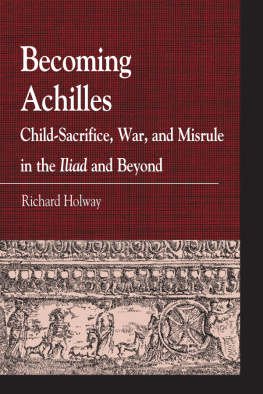
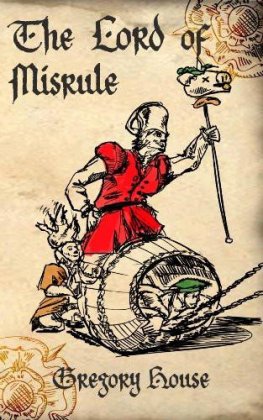
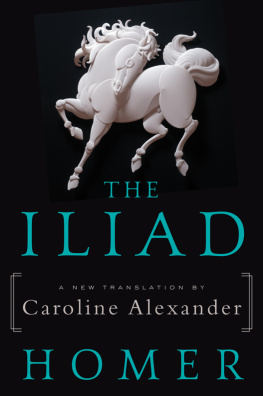
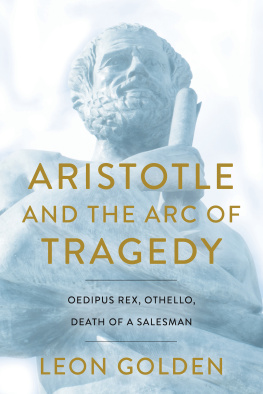
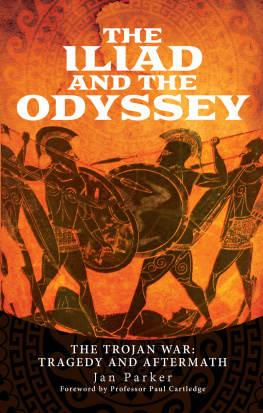
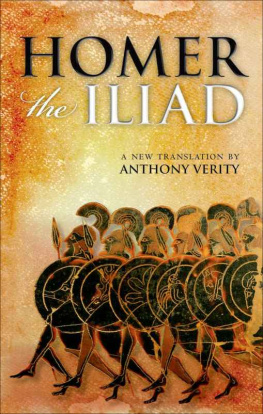
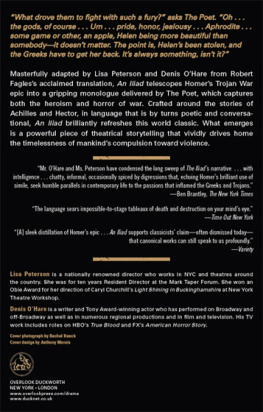

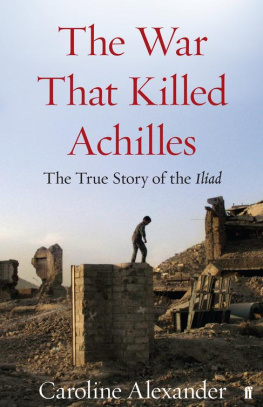
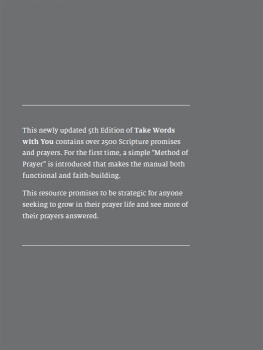
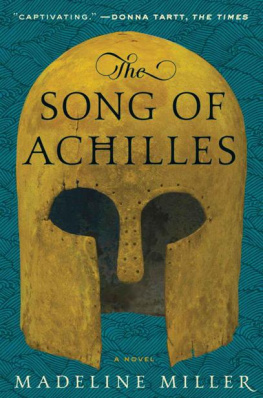
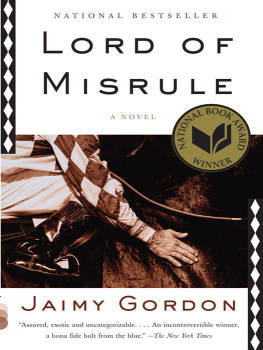
 The paper used in this publication meets the minimum requirements of American National Standard for Information SciencesPermanence of Paper for Printed Library Materials, ANSI/NISO Z39.48-1992.
The paper used in this publication meets the minimum requirements of American National Standard for Information SciencesPermanence of Paper for Printed Library Materials, ANSI/NISO Z39.48-1992.